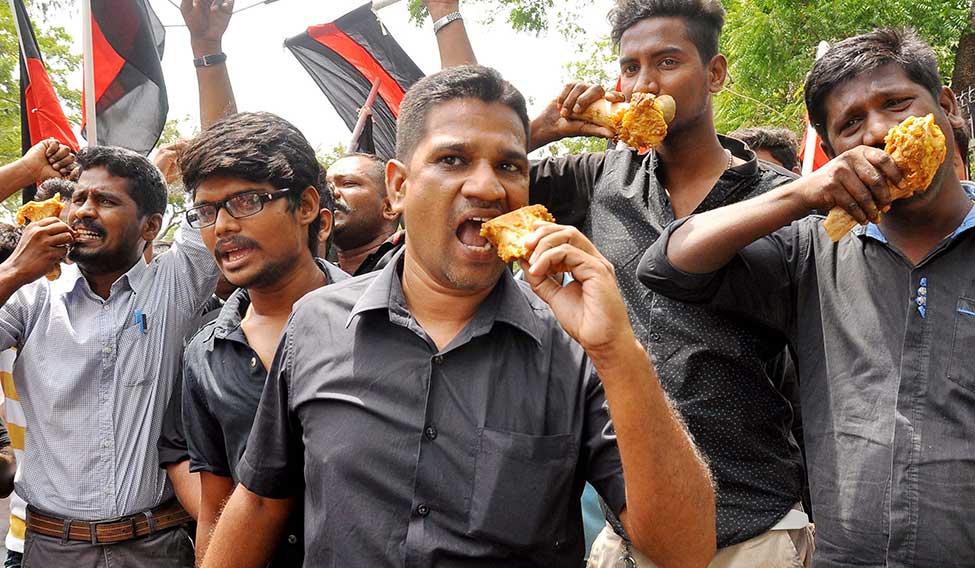Bachcha Marak does not eat beef regularly. But the former BJP district president of North Garo Hills in Meghalaya has a beef with the Union government’s May 23 notification to ban the sale of cattle for slaughter in animal markets.
Bachcha joined the BJP last year with his friend Bernard Marak, who was the district president of West Garo Hills. A week ago, Bernard hosted a beef party to celebrate three years of the Narendra Modi government. He was reportedly asked to resign, and he obliged, saying he was a Garo first and then a politician. Bachcha followed suit on June 6.
“I cannot accept this [notification],” said Bachcha. “Why would not they understand that we need beef to survive? We the people of the hills have to eat meat for energy. Children are given beef, which comes at a low price.” He blamed the RSS for the ban. “I know the prime minister was asked by the RSS to take such a mindless decision.”
Also, Bachcha said the ban will affect the BJP politically—Meghalaya will go to the polls next year, and the party hopes to wrest power from the Congress. “People will give them a fitting reply in the coming days,” he said. State BJP president Shibun Lyngdoh, however, said there was no threat to the party’s chances in the northeast.
Meghalaya is not alone though. Other northeastern states, too, are openly opposing the ban. The Congress government in Mizoram said that it would not impose the ban. So did the Naga People’s Front-BJP government in Nagaland. State BJP president V. Lhoungu said beef was the main dish in almost the entire northeast region. “I hope our government would reconsider the ban,” he said.
According to the 2016 Meat Traders Association report, about 6 crore people in the northeast consume more than 1.2 lakh tonnes of beef or buffalo meat annually; the national annual figure is 9.5 lakh tonnes. Only 10 percent of the total consumption of meat comes from buffalo. The pork consumption in northeast is around 80,000 tonnes annually.
 Bachcha Marak
Bachcha Marak
In Manipur, the BJP-led government ignored the ban. “Considering the huge population of Christians and the few Muslims, we have decided not to force the government to implement the ban,” said Robin Blackie, BJP general secretary in Manipur.
In Goa, too, the BJP government is in no hurry to implement the ban. “Our government has not banned it, but has asked the slaughterhouses not to kill milking cows,” said Vinay Tendulkar, Goa BJP president. Also, a campaign urging meat lovers to change their menu was under way. “We have also informed our central leadership about our inability to implement the ban,” said Tendulkar.
Goa largely gets cows and buffaloes from other states like Karnataka, where the Congress is in power, said Uday Pednekar, managing director, Goa Meat Complex Limited. But the Karnataka BJP is preventing traders from selling cows. Pednekar said that earlier his slaughterhouse used to butcher around 120 to 130 cows a day. “But today we are doing 30 to 40 [cows] per day,” he said. Pednekar said they conducted a series of checks, including medical, before slaughtering. “If the cow is not healthy or it gives milk, we are not allowed to slaughter the cow,” he said.
While the BJP-ruled states are tiptoeing their way around the ban, other states like West Bengal have criticised the Modi government for the ban. The annual beef consumption in West Bengal is around 75,000 tonnes. “Banning of food items is a state subject. I don’t know why the Central government has taken such a decision,” said education minister Partha Chatterjee. “The government can step in only if a certain food is unhealthy.”
But the BJP wants the ban to be imposed immediately. “Apart from consuming beef, West Bengal and Assam also smuggle cows to Bangladesh for slaughtering. We must stop this. Cow slaughtering was banned during freedom movement as well. We are forgetting history,” said Biswapriya Roy Chowdhury, general secretary of West Bengal BJP.
Down south, the reaction against the ban has been vehement and in some cases violent. In IIT Madras, a research scholar, R. Sooraj, was attacked for participating in a ‘beef fest’ on May 28. He was among 80 students who had gathered to discuss what they called ‘food fascism’.
“We usually sit down in the humanities department to discuss the sociopolitical angles of any issue. Similarly, we discussed the sociopolitical issue of slaughter ban and decided to eat beef. But it was not a beef fest like the one in Hyderabad University or Osmania University,” said Manoj Parameswaran, a research scholar in sociology.
After the discussion, Sooraj went to the Jain (vegetarian) mess, where he was attacked by a group of students, allegedly ABVP sympathisers. His right eye was damaged and his cheekbone broken.
Hailing from Malappuram in Kerala, Sooraj is a senior research fellow at the department of aerospace engineering, and has published several papers in academic journals including a Cambridge University journal. “Sooraj is known to the institute community as a quiet and soft spoken person. He has no history of aggression whatsoever,” said Dr A. Sameen of the department.
The attack on Sooraj, said students, was a reflection of the changing culture of dissent and resistance at IIT Madras. A campus that had never seen any protests over issues like fee hike was witnessing attacks for right to food, said a research scholar from the humanities department. Also, of late, organisations like Vivekananda Study Circle and Vande Matram Study Circle have been getting monks and sanyasis to deliver lectures on Vedic knowledge and Vedic sciences and to promote caste Hindu ideologies through their discourses. Any criticism of such discourses was unwelcome. Students said they were not against such discourses; they only wanted space for every voice. Students have now appealed to the IIT management to expel Sooraj’s assailants. “I am not going to give up now. I never thought I will be attacked for having my own views,” said Sooraj, who had trouble talking because of the fracture.
The issue has turned political. While DMK’s M.K. Stalin called up Sooraj to inquire about his health, the BJP’s H. Raja demanded the dismissal of the IIT Madras dean for allowing the beef fest to happen.
Meanwhile, the courts have been involved, too. While the Madras High Court stayed the Centre’s ban, the Kerala High Court declined to do so. On June 15, the Supreme Court will hear a petition, filed by a Hyderabad-based organisation, challenging the ban.







